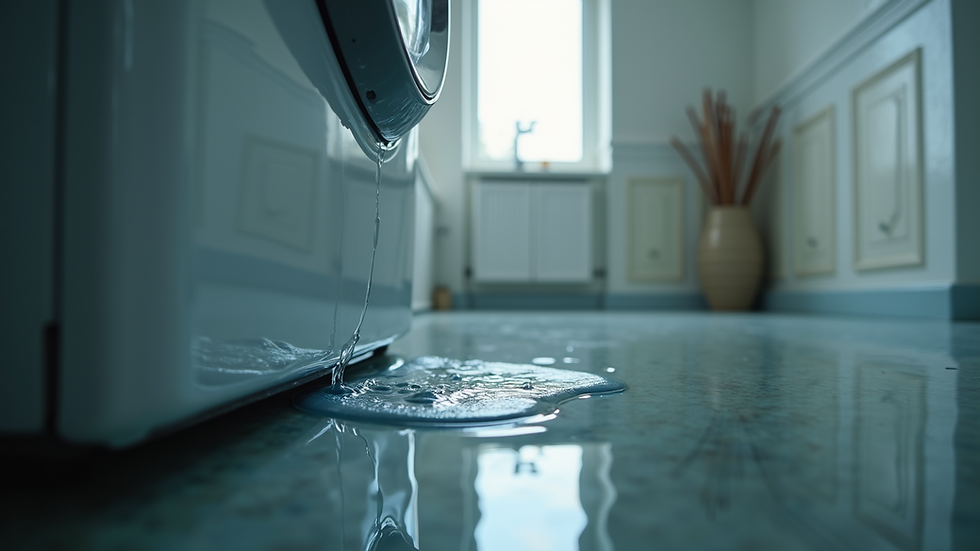Troubleshooting Common Washing Machine Problems
- Mohammed Irshad baig
- Jul 18, 2025
- 3 min read
Updated: Jan 15
Washing machines are essential household appliances that make laundry day a lot easier. However, even the most reliable machines can run into problems. Understanding these issues can save you time and money and avoid the hassle of calling for professional help. In this guide, we will explore some common washing machine problems, their potential causes, and practical solutions to help you troubleshoot effectively.
Common Washing Machine Issues
When your washing machine acts up, it can be frustrating. Some of the most prevalent issues include failure to start, excessive noise, leaks, and improper spinning. Identifying the problem is the first step in resolving it.
Washing Machine Won't Start
One of the most common washing machine problems is when it simply won’t start. This can happen for various reasons.
Power Issues: Ensure that the machine is plugged in. Check for the circuit breaker; sometimes a tripped breaker can cut off power.
Door Lock: Most machines have a safety feature that prevents them from starting if the door isn't properly closed. Check if the door latch is functioning.
Faulty Control Panel: If the power supply is fine, you might be dealing with a malfunctioning control panel. This issue usually requires a technician.

Excessive Noise During Operation
Does your washing machine sound like it's about to take off? Loud noises can indicate several problems.
Unbalanced Load: If the load is unevenly distributed, it can cause the washer to shake and make noise. Try redistributing the clothes evenly.
Worn-out Bearings: Over time, the bearings can wear out, resulting in a rumbling sound during the spin cycle. This typically needs professional attention.
Foreign Objects: Sometimes, coins or small items can get trapped in the drum or pump. Inspect your washer for any foreign objects.

Leaking Water
A leaking washing machine can cause severe water damage if not addressed promptly.
Hose Connection: Check the hoses connected to the washing machine. If they're loose or damaged, they can cause leaks. Tighten any loose connections and replace damaged hoses.
Door Seal: Inspect the door seal for wear and tear. A damaged seal can lead to water escaping during cycles. If you notice cracks or deterioration, replace the seal.
Drainage Issues: Blocked drainage hoses can also lead to leaks. Ensure that the drain hose is clear and positioned correctly.

Washer is Not Spinning Properly
If your washing machine isn't spinning, it can leave your clothes soaking wet.
Overloading: Overloading the washer can prevent it from spinning correctly. Ensure you follow the manufacturer's recommended load size.
Lid Switch: A faulty lid switch can prevent the machine from spinning. Test the switch and replace it if necessary.
Drive Belt Issue: If the drive belt is worn or broken, it will not spin the drum. Inspect the belt and replace it if it shows signs of wear.
Smells and Odors
Bad odors can stem from various sources in your washing machine.
Mildew: Leaving wet clothes in the washer can lead to mildew. Always remove clothes promptly and let the drum air out.
Build-Up: Detergent and fabric softener can accumulate in the drum and dispensers. Run an empty hot wash cycle with vinegar or a washing machine cleaner to eliminate buildup.
Drain Issues: A dirty drain filter can trap odors. Clean the drain filter regularly to avoid unpleasant smells.
Regular Maintenance Tips
Maintaining your washing machine can help prevent many common issues from arising.
Clean the Machine: Run a monthly cleaning cycle to remove detergent residue and odors.
Inspect Hoses: Check hoses regularly for signs of wear. Replace as needed to prevent leaks.
Level the Machine: Ensure your machine is level to prevent excessive shaking and noise.
When to Call a Professional
While many common issues can be resolved with a bit of troubleshooting, sometimes more complex problems need expert assistance. If you notice persistent leaks, strange mechanical sounds, or if the machine fails to operate despite following troubleshooting tips, it is best to reach out for professional help. Consider the benefits of professional washing machine repair if DIY fixes do not yield results.
Final Thoughts
Washing machines are convenient appliances that, when functioning well, save us time and effort. By understanding common problems and their solutions, you can troubleshoot effectively and keep your washing machine running smoothly. Regular maintenance is key to avoiding significant issues down the line. Remember, if you feel uncertain about any repairs, don’t hesitate to contact a professional for assistance.
With the right knowledge and a proactive approach, you can ensure that laundry day remains a hassle-free experience. Happy washing!




Comments